Book contents
- Law and Identity in Israel
- Cambridge Studies in Law and Judaism
- Law and Identity in Israel
- Copyright page
- Dedication
- Contents
- Introduction
- Part I Seeking to Fashion National Law
- Part II The Resurgence of Cultural Conflict
- Part III Zionism, Democracy, Law, and Culture
- Conclusion
- List of Legal Cases
- Legislation
- Bibliography
- Index
Conclusion
Published online by Cambridge University Press: 24 October 2019
- Law and Identity in Israel
- Cambridge Studies in Law and Judaism
- Law and Identity in Israel
- Copyright page
- Dedication
- Contents
- Introduction
- Part I Seeking to Fashion National Law
- Part II The Resurgence of Cultural Conflict
- Part III Zionism, Democracy, Law, and Culture
- Conclusion
- List of Legal Cases
- Legislation
- Bibliography
- Index
Summary
Zionism and the question of identity are fundamentally in tension. On the one hand, the Zionist movement came into being as a response to the anxiety felt by European Jews regarding their identity and culture in the face of secularization and modernization. If Judaism was merely a religion, then non-believing and non-observant Jews ostensibly had no cause to think of themselves as Jews anymore. If it was simply an ethnic culture, it seemed to many poor and backward compared with the cultures around them. Zionism told the Jews that they were a nation, on a par with all the other awakening nations of Europe, and thus supplied them with a new, common, and inclusive identity shared by all Jews no matter what their religious beliefs and practices and despite their cultural diversity. Furthermore, Zionism’s fundamental claim, that the Jews are a nation with a common history, common fate, a shared connection to an ancestral land, and other collective cultural traits, was the source of Zionism’s strength as an idea and as a practical program, as it offered a national narrative that was accepted, almost intuitively, by the Jewish masses in Europe and around the world.
- Type
- Chapter
- Information
- Law and Identity in IsraelA Century of Debate, pp. 193 - 202Publisher: Cambridge University PressPrint publication year: 2019

